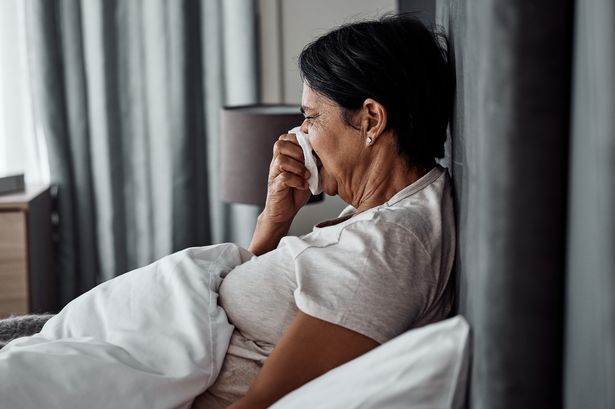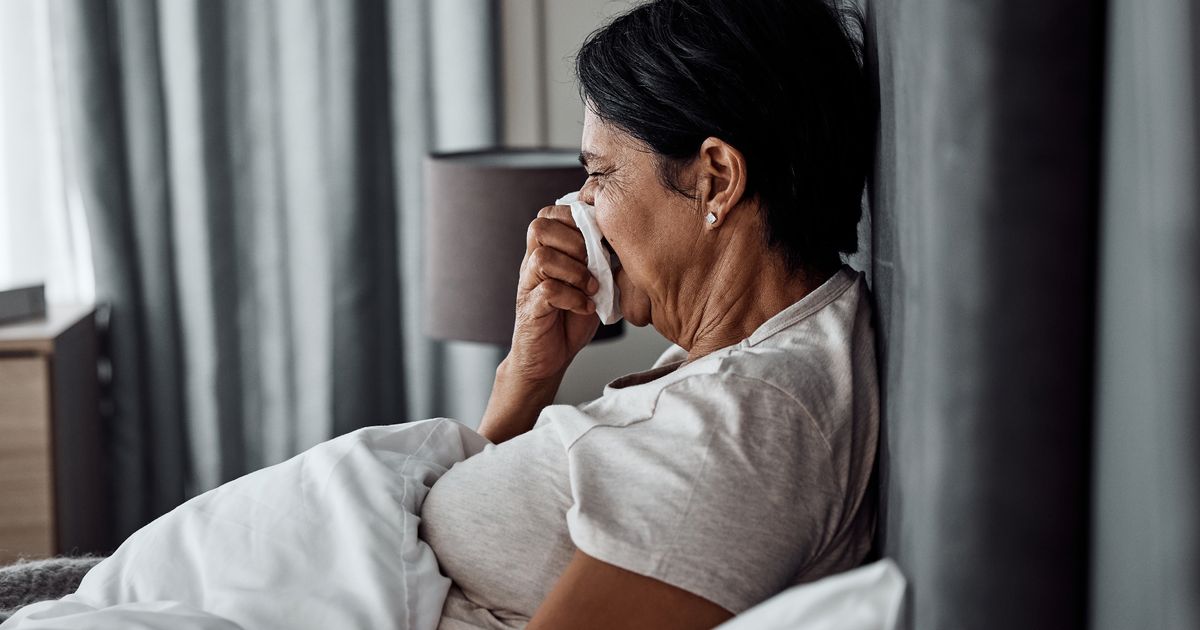Health officials have urged the public to protect themselves and others against Covid, flu, RSV and norovirus as winter illness season gets under way Common symptoms of Covid can include a headache, sore throat and runny nose – but there are other more serious signs to watch out for(Image: Getty Images)
Common symptoms of Covid can include a headache, sore throat and runny nose – but there are other more serious signs to watch out for(Image: Getty Images)
Households across the UK have been urged to make sure they can recognise the symptoms of winter illnesses and take steps to protect themselves and others – as well as knowing when to seek extra help. The UK Health Security Agency (UKHSA) is monitoring the spread of viruses including flu, Covid-19, RSV and norovirus as temperatures begin to fall.
Earlier this month, the agency reported a rise in Covid cases with new variants XFG and NB.1.8.1, sometimes referred to as the Stratus and Nimbus strains, driving the increase. While the latest UKHSA update released on October 23 saw Covid cases decreasing, compared to a considerable rise in flu activity, health officials have issued a reminder to the public about the importance of taking steps to protect against the virus.
Dr Jamie Lopez Bernal, consultant epidemiologist at the UKHSA, said: “Anyone experiencing flu or Covid-19 symptoms, including high temperature, cough and feeling tired or achy, should try to minimise contact with others, particularly with those who may be vulnerable. If you have symptoms and need to leave the house, our advice remains that you should consider wearing a face covering.
“Washing hands regularly and using and disposing tissues in bins can reduce the spread of these illnesses, as can ensuring that indoor areas are well ventilated,” he added. The UKHSA also reiterated the importance of everyone who is eligible ensuring they get their vaccines against these winter illnesses.
According to the NHS, the full list of Covid symptoms can include:
a high temperature or shivering (chills) – a high temperature means you feel hot to touch on your chest or back (you do not need to measure your temperature)a new, continuous cough – this means coughing a lot for more than an hour, or three or more coughing episodes in 24 hoursa loss or change to your sense of smell or tasteshortness of breathfeeling tired or exhaustedan aching bodya headachea sore throata blocked or runny noseloss of appetitediarrhoeafeeling sick or being sick
Our ChronicleLive Daily newsletter is free. You can sign up to receive it here. It will keep you up to date with all the latest breaking news and top stories from the North East.
However, these symptoms are very similar to those of other illnesses, such as colds and flu. Regardless, if you are experiencing these symptoms and you have a high temperature and/or you do not feel well enough to go to work, school, childcare or do your normal activities, the health service advises trying to stay at home and avoiding contact with other people.
While most people who contract Covid will feel better within a few weeks, for some people it can be a more serious illness, and there are some cases in which you should seek urgent help from a GP or NHS 111. The NHS states that you must do this if any of the following apply:
you’re worried about your or a child’s Covid-19 symptoms or are not sure what to dothe symptoms are getting worse or are not getting betteryou or a child have other signs of illness, such as a rash, loss of appetite or feeling weakyou or a child have a high temperature that lasts five days or more or does not come down with paracetamola child under three months old and has a temperature of 38C or higher, or you think they have a high temperaturea child three to six months old and has a temperature of 39C or higher, or you think they have a high temperature
It’s especially important to seek help if you are at increased risk of getting ill from the virus, such as if you’re pregnant, aged 60 or over or have a weakened immune system. The NHS says you must call 999 or go to A&E if you or a child:
seems very unwell, is getting worse or you think there’s something seriously wrong – children and babies in particular can get unwell very quicklyget sudden chest painare so breathless you’re unable to say short sentences when resting or your breathing has suddenly got worse – in babies their stomach may suck in under their ribsstart coughing up bloodcollapse, faint, or have a seizure or fit for the first timea rash that does not fade when you roll a glass over it, the same as meningitis. Join our WhatsApp communities
Join our WhatsApp communities
ChronicleLive is now on WhatsApp and we want you to join our communities.
We have a number of communities to join, so you can choose which one you want to be part of and we’ll send you the latest news direct to your phone. You could even join them all!
To join you need to have WhatsApp on your device. All you need to do is choose which community you want to join, click on the link and press ‘join community’.
No one will be able to see who is signed up and no one can send messages except the ChronicleLive team.
We also treat our community members to special offers, promotions, and adverts from us and our partners.
If you don’t like our community, you can check out any time you like. To leave our community click on the name at the top of your screen and choose ‘exit group’.
If you’re curious, you can read our privacy notice.
Join the ChronicleLive Breaking News and Top Stories community
Join our Court & Crime community
Join the Things to do in Newcastle and the North East community
Join our Northumberland community
Join our County Durham community
Join our Great North Run community

